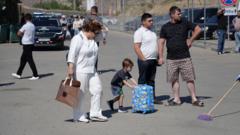The Agarak border crossing between Armenia and Iran has become a poignant symbol of the ongoing turmoil between Israel and Iran, as individuals and families seek refuge from escalating violence. Amidst dry and rocky mountains, the barren landscape contrasts sharply with the desperate need for safety felt by those arriving at this remote checkpoint.
Among the weary travelers is a woman sporting a trendy haircut, clutching her baby while her husband engages taxi drivers. Nearby, a family of three, en route to their home in Austria, adds to the gathering of individuals crossing the border. Many of those leaving Iran possess residency or citizenship in other nations, driven away by the violent conflict currently embroiling their homeland.
Since the onset of hostilities on June 13, when Israel commenced airstrikes on Iranian military and populous sites, the bitter reality has solidified for many. Reports from the Human Rights Activists News Agency (HRANA) indicate that at least 657 lives have been lost due to the clashes, with Iran responding in kind through missile attacks on Israeli territories that have already resulted in at least 24 deaths.
The atmosphere in Tehran is described as increasingly perilous. Residents are urged to evacuate certain areas as heavy traffic moves out of the city of 10 million. One father from Tabriz recounted, “Every place is dangerous; it’s not normal,” highlighting the fear that grips even those far from the epicenter of violence.
Witness accounts reveal that many made the arduous journey to Armenia by car, taking upwards of 12 hours to escape the turmoil. A nameless Afghan evacuee lamented over the unchecked bombardments in Tehran, narrating a harrowing experience of panic where nightly explosions robbed citizens of sleep.
"I just escaped from there the hard way," he said, echoing sentiments of unease pervasive among refugees. Another young woman returning to her home in Australia captured the fear ingrained in her experiences, visibly shaken and unwilling to divulge the horrors she had encountered.
Conversely, not all travelers at the border are fleeing. Some, like Ali Ansaye, returning from a holiday in Armenia, express indifference toward the escalating conflict, declaring, “I have no concerns, and I am not scared at all.” His strong sentiments reflect a defiance against perceived external threats from Israel.
The unfolding situation has led to divergent views among travelers. As some believe the conflict may threaten Iran's regime, others like Javad, who was on summer break in Sabzevar, firmly reject such notions, expressing loyalty and resilience against Israeli actions.
The current crisis underscores the intricate web of fear, migration, and conflict present in the region, with only hope for a peaceful resolution lingering amidst the uncertainty.














